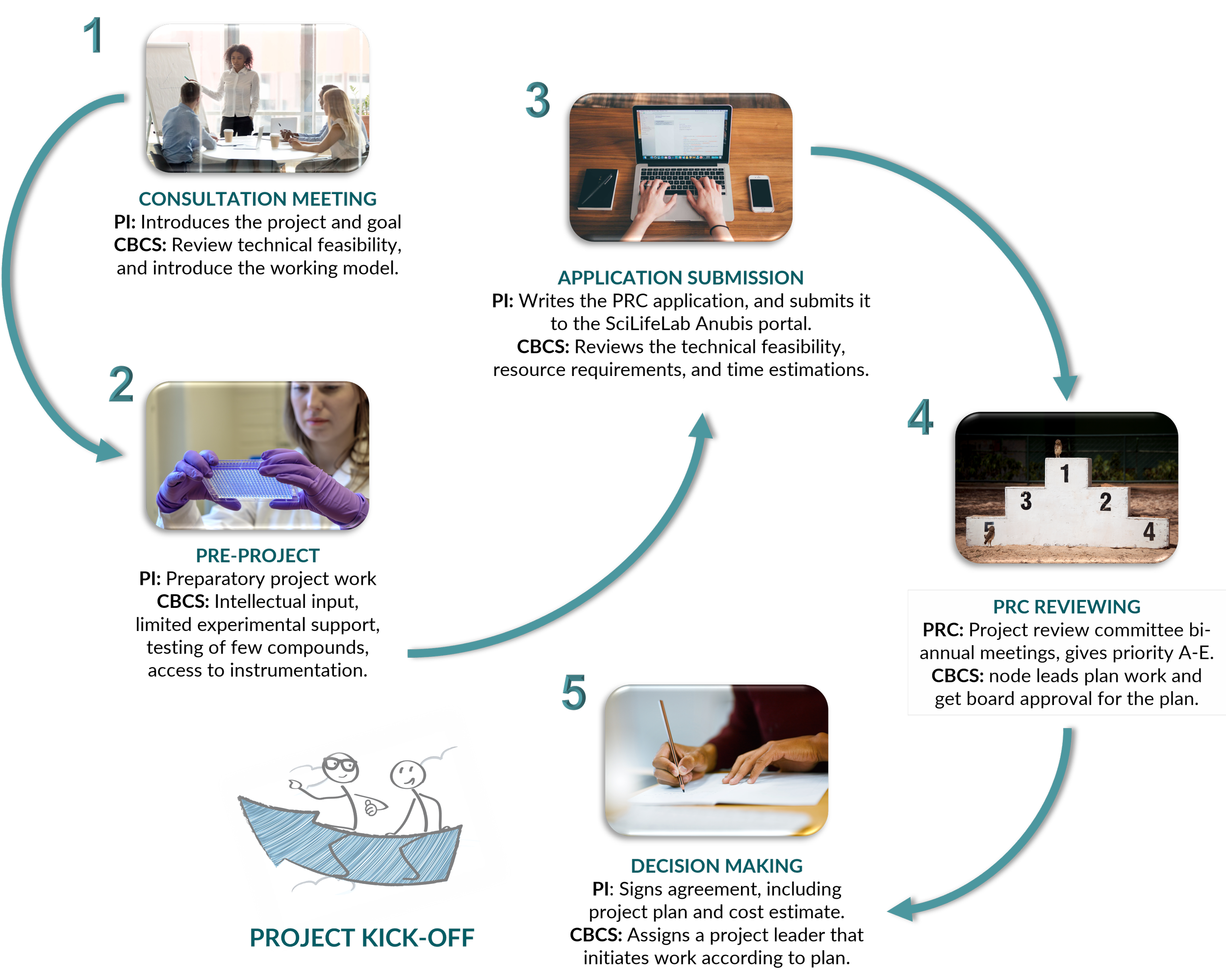It all starts with a conversation!
All collaborations with CBCS begin with an informal meeting—either online or in person at one of our facilities. This initial conversation is an opportunity to discuss your project's background, objectives, and explore how we can best support your research. From there, we’ll guide you through the appropriate next steps.
At CBCS, we operate under a collaborative research model built on mutual commitment between our team and the lead investigator. Our support spans a wide spectrum—from brief consultations and access to cutting-edge instrumentation, to complex, multi-year research projects.
Whether your needs are small-scale or highly ambitious, we're here to help. Smaller initiatives requiring minimal time and resources can often be accommodated quickly and without a formal application process.
View the CBCS accessibility document HERE (opens in a new window).
The CBCS Project Review Committee
For larger or more resource-intensive projects, CBCS employs a formal application and peer-review process to ensure that resources are allocated based on scientific merit and potential impact. Once your project has been introduced and discussed with our team, you may be invited to submit a formal Project Application to the CBCS Project Review Committee (PRC).
Established in 2011, the PRC is composed of independent experts in the field of chemical biology, including representatives from both academia and industry. The committee convenes twice a year to evaluate all project applications submitted during the preceding six months.
Each application is assessed using transparent evaluation criteria—scientific excellence, novelty, technical feasibility, and relevance are key factors. Projects that receive high scores are prioritized for support and assigned the appropriate CBCS resources. Lower-priority proposals may also be supported, depending on the availability of personnel and infrastructure.
Onboarding of larger projects through PRC
Project cost overview
We understand that small-molecule discovery can be costly and that academic funding is often limited, particularly when initiating new research directions. That’s why CBCS is committed to making collaboration as accessible and cost-effective as possible.
The financial model for CBCS collaborations varies depending on the scope and nature of the project. Whether the project is PRC-approved, small-scale, or full-cost, most expenses related to personnel, infrastructure, instrumentation, and standard consumables are typically co-funded by CBCS within academic collaborations. All cost assessments are made transparently and before project initiation.
CBCS uses a full-cost calculation model to ensure transparency and sustainability. The non-academic full cost is 1,600 SEK/hour, covering personnel, instruments, services, rents, and basic supplies. The price is reduced to 800 SEK/hour for academic service projects. Projects prioritized by the Project Review Committee (PRC) receive further subsidies: 300 SEK/hour for assay development support and 500 SEK/hour for screening or chemistry support.
To support project planning and cost estimation, the following table summarizes key details related to compounds and cost structures across different project types. If you have any questions, please contact any of the CBCS nodes for more information.
(1) For up-to-date compound costs and details on compounds and screening sets, please visit the Compound Centers website. (2) Larger volumes are available at a higher cost. Visit Compound Centers website for specs. (3) For budgeting purposes, we recommend that collaborators estimate assay reagent costs by calculating the price per reagent volume in a 384-format well, then multiplying it by the number of compounds to be screened (e.g., 50,000).
Industrial and International Collaborations
Astra Zeneca Open Innovation
Since 2017, CBCS has partnered with AstraZeneca Open Innovation program to facilitate academic access to AstraZeneca’s unique annotated small molecule compound library. This collaboration enables researchers to explore novel biology using high-value chemical tools that are otherwise not publicly available.
Projects under this initiative are typically centered on phenotypic assays, which offer strong translational potential and the ability to uncover new therapeutic mechanisms. The AstraZeneca library includes approximately 14,000 well-characterized compounds, each selectively targeting one or more of over 1,700 human proteins, providing a powerful resource for target discovery and validation.
EU OPENSCREEN
EU-OPENSCREEN is a European infrastructure that connects high-capacity chemical biology screening platforms across the continent, fostering collaborative research and shared access to cutting-edge resources.
In 2022, Sweden became the tenth member country to join this network, expanding EU-OPENSCREEN’s reach and capabilities. As part of this expansion, Chemical Biology Consortium Sweden (CBCS), including CBCS Umeå and CBCS KI, was selected as the official Swedish partner site—further strengthening Sweden’s role in the European chemical biology landscape.
Additional Partnerships
CBCS actively contributes to the broader research community through a range of strategic partnerships and networks.
We are a key partner in the Nordic Chemical Biology Network, including participation in specialized subnetworks such as the Nordic High-Content Screening Community, which fosters knowledge exchange and collaboration across the region.
In addition, CBCS is an associated partner of EUbOPEN, a major initiative funded by the Innovative Medicines Initiative (IMI). This ambitious European program focuses on generating open-access chemical probes and tools to advance drug discovery and target validation.




